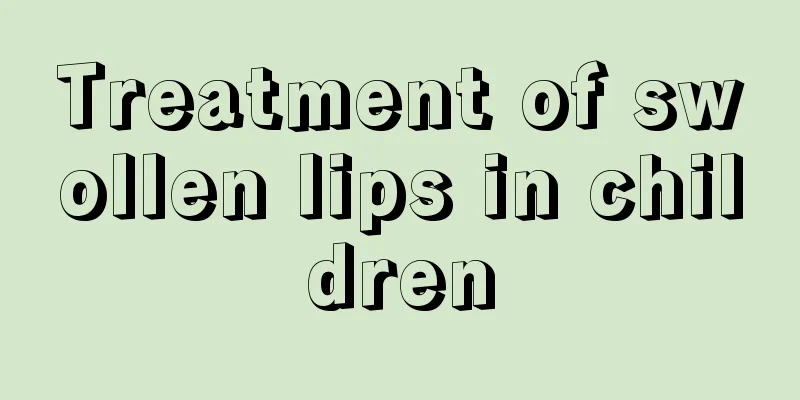Treatment of swollen lips in children

|
People's bodies are made up of many different parts, some of which are located inside the human body to help people's normal body work, while others play an important role in people's lives. For example, feet are used for walking, hands are used to hold a pen to write or eat, and so on. When talking about eating, we have to mention the recent problem of swollen lips in children. Let me talk about the causes of this condition and the treatment of swollen lips in children. When a child wakes up one night and suddenly finds his lips swollen, the parents are very scared and anxious, not knowing what acute illness he has and rushing to the hospital for emergency treatment. Most doctors consider this condition to be angioedema. Swelling of lips for no reason may be angioedema. Angioedema is mainly an allergic reaction limited to the skin and subcutaneous tissue, which can be caused by drug allergies, insect stings, desensitization injections or eating certain foods (especially eggs, shells, and nuts). It is a temporary, localized, painless subcutaneous or submucosal edema. The main cause of the disease is type I allergic reaction caused by foreign proteins or drugs. [Diagnostic points] ① It is more common in the loose connective tissue around the lips, more often in the upper lip than in the lower lip. ② The swelling develops rapidly and is obvious within 10 minutes. The edema area is bright and flushed, painless but with a feeling of distension, burning and itching. The swelling may last for several hours or may subside in 1 to 2 days. ③ Edema is most common in the upper lip, manifested as thickening and protruding upper lip, or limited to the upper lip-wing area. If it occurs on the tongue or palate, it may cause temporary language and eating disorders. Severe edema can spread to the floor of the mouth and throat, causing breathing difficulties. 【Treatment principles】① Quickly identify and eliminate allergens. ② Apply calamine lotion on lips to protect skin and relieve itching. ③ Use antihistamines and corticosteroids if necessary. ④ Pay attention to cases where the disease spreads to the oropharynx and causes breathing difficulties, and perform preventive tracheotomy if necessary. Common causes include: 1. Food They mainly include animal protein (such as fish, shrimp, crab, shellfish, meat, milk and eggs), plant foods (such as berries, strawberries, cocoa, tomatoes and garlic) and certain food condiments and additives. Some of these foods can act as allergens and cause allergic reactions in the body, while others can stimulate mast cells to release histamine. 2. Medication Many drugs cause this disease by causing allergic reactions in the body. Common ones include penicillin, serum preparations, various vaccines, furazolidone and sulfonamides, etc.), and some drugs can be histamine releasers (such as aspirin, morphine, codeine, quinine, iodide, atropine, pilocarpine, poppycorene and polymyxin B, etc.). 3. Infection Various viral infections, bacterial infections and parasitic infections. 4. Physical factors Various physical factors (such as cold, heat, sunlight, friction and pressure) can cause illness in some patients. 5. Animal and plant factors Animal fur, insect toxins, snake venom, jellyfish toxins and pollen, etc. After the above-mentioned food, drug, bacteria and other antigens or haptens enter the body, they act on plasma cells to produce IgE, which attaches to mast cells, causing them to degranulate and release biologically active substances such as histamine, bradykinin, 5-hydroxytryptamine, and slow-reacting substances, causing small blood vessels and capillaries to dilate and increase permeability, causing tissues to swell rapidly. Hereditary angioedema is inherited in an autosomal dominant manner and is primarily caused by a defect in C1 esterase inhibitor function. The treatment method for swollen lips in children has been told to everyone. This is the cause and treatment of this situation. Children’s self-protection awareness is not very strong, so the prevention and treatment methods I introduced above are only for general situations. Swollen lips in children is a common symptom that can occur in many different situations. So if special circumstances arise, it is not just the treatment methods I mentioned above that should be used. You should seek medical attention immediately and get new treatments. |
<<: What to do if your child's lips peel
>>: How to deal with recurring fever in infants and young children
Recommend
What should I do if my child vomits due to gastrointestinal cold?
People will suffer from various gastrointestinal ...
Can babies get vaccinations for mild colds?
Vaccinations are generally what we often call vac...
Signs of baby's growth
Generally speaking, the baby's infant period ...
Causes of retinal hemorrhage in premature infants
Every child is full of hope for the family. Often...
Can a newborn baby be bathed every day?
Bathing a newborn every day is very bad for the n...
What to do if your child has calf muscle pain
Sometimes, children will experience bone pain dur...
What’s going on with the red blood streaks on my child’s face?
When there are many red blood streaks on the face...
How to deal with toothache in children? 5 ways to help you
Toothache is not a disease, but it is really pain...
The easiest way to treat a child's stuffy nose
Children often have nasal congestion problems. In...
What is the cause of leg pain in children when they sleep at night?
Being able to ensure adequate sleep will allow us...
How to treat tooth loss in children?
Children's teeth fall out but permanent teeth...
Tips for baby's four-month-old food accumulation
Under normal circumstances, four-month-old babies...
What are the symptoms of a child being frightened?
Every child has fear. No matter how brave the chi...
Which cough medicine is best for children?
Children generally don’t like to take medicine wh...
What can umbilical cord blood sampling reveal?
Umbilical cord blood puncture is a painless exami...









